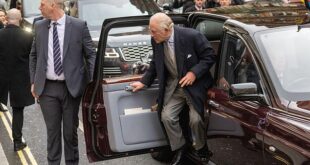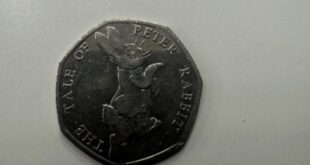Mayfair-based hedge fund Marshall Wace emerges with a £100m bet against Tesco, Britain’s biggest supermarket
Mayfair-based hedge fund Marshall Wace has emerged with a £100million bet against Tesco, Britain’s biggest supermarket.
The secretive fund, run by Sir Paul Marshall and Ian Wace, is using so-called ‘short’ contracts to make money if the share price falls.
The position has been revealed in official data published by the Financial Conduct Authority, which requires hedge funds and other short-sellers to publish their stakes.
Pushed around: Tesco has been one of the most resilient stocks on the market through the pandemic and is regarded as a solid investment compared with its smaller rivals
Marshall Wace may already have banked several million pounds from the move after the FTSE100 grocer’s shares tumbled by 7.4 per cent last week.
Tesco has been one of the most resilient stocks on the market through the pandemic and is regarded as a solid investment compared with its smaller rivals.
But gloomy updates from its US peers in recent days have battered the stock prices of global retailers. Walmart and Target, two of the largest chain stores in America, warned that inflation headwinds are intensifying.
Target shares dropped 25 per cent on Wednesday after its update – the biggest decline in its stock since the Black Monday market crash of 1987.
In Britain, higher energy and fuel prices have pushed inflation to a 40-year high of 9 per cent in April and the Bank of England has warned it could hit double digits later this year.
Clive Black, director at Shore Capital, said: ‘Traditionally, supermarkets have been very resilient but inflation figures in the UK and US this week have been higher and risen faster than many expected.
‘There were also big downgrades that came through in America that show the pace at which inflation is hitting shoppers’ behaviour.
‘Companies are also struggling because they can’t pass on the added costs to customers.
‘It would seem that Marshall Wace has taken a dim view on Tesco’s capability to withstand these rising pressures. But if Tesco catches a cold, then a lot of other discretionary retailers [selling nonessential goods] will catch a flu.’
Marshall Wace and other short-sellers have also made bets against a host of other retailers as shoppers have tightened their purse strings.
Half the top ten most shorted stocks are retailers, including Asos, Currys, Boohoo, B&Q-owner Kingfisher and AO World.
Currys’ shorts are at an all-time high of 6.4 per cent, despite starting this year with none at all. Sainsbury’s, Marks & Spencer and Ocado are also in the firing line.
The total number of short positions across the retail sector has increased to more than £1billion.
Marshall Wace has also taken stakes against a number of big-name companies, including miner Fresnillo, Royal Mail, WHSmith and Deliveroo. In April, it was found to be the fund manager with the greatest European short exposure, accounting for 22 per cent of registered short positions.
Marshall, who set up the firm with Wace in 1997, is the father of former Mumford & Sons banjo player Winston, who was ‘cancelled’ and forced to quit the band after praising a book by a Right-wing American author on social media.
Marshall has also been outspoken – last year slamming the City for allowing the UK stock market to fall behind its rivals because investors are too obsessed with chasing dividends.
This is leaving companies undervalued and unnecessarily ripe for takeovers, he said, and risks London become a ‘sort of Jurassic Park’ where fund managers ‘dedicate themselves to clipping coupons rather than encouraging growth and innovation’.
Despite its solid performance, Tesco was criticised earlier this month for paying chief executive Ken Murphy £4.75million last year. This included the highest annual bonus awarded by the supermarket since 2016.
Advertisement
Source link



